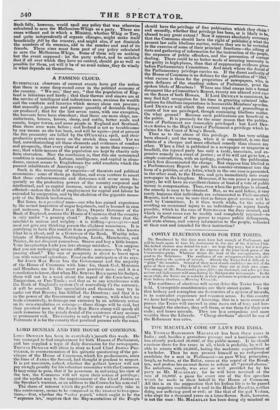LORD DENMAN AND THE IIOUSE OF COMMONS.
Loan DENMAN has been in everybody's :mouth this week. He has managed to find employment for both Houses of Parliament, and has supplied a topic of daily discussion for the newspapers. THOMAS DENMAN Will shine in story AS Lord Chief Justice PRI- VILEGE, in commemoration of his quixotic questioning of the pri- vileges of the House of Commons, which his predecessors, since the time of JAMES the Second, had thought it prudent to respect. It is yet uncertain, indeed, whether the gallant lawyer will not pay an ugly penalty for his volunteer encounter with the Commons. It may come to pass, that if he persevere in enforcing his view of the law, the Commons will act upon their notion of privilege; and the upshot may be the imprisonment of the Chief Justice on the Speaker's warrant, or an address to the Crown for his removal !
The share of interest which the public may rationally take in this controversy, seems to be comprised in the answer to two ques- tions,—first, whether the "solos populi," which ought to be the "supreme hex," requites that the Replesentatives of the People
should have the privilege of free publication which they claim ? and secondly, whether that privilege has been, or is likely to be abused to any great extent ? Now it appears absolutely necessary' that the Commons should have the right of publishing what the present law calls libellous matter, unless they are to be curtailed
in the exercise of some of their principal functions—the sifting of facts and gathering of information for the instruction of the people, the exposure of public offenders, and the prevention of corrupt dealing. There could be no better mode of securing immunity to the guilty in high places, than that of suppressing evidence given before Parliamentary Committees. And mark where the denial of the Parliamentary privilege carries us. If the direct authority of the House of Commons is no defence for the publication of " libel," what excuse is there for the proprietors of newspapers, who, in open defiance of the standing orders of Parliament, print the spoken libels of Members? Where one libel creeps into a formal document like a Committee's Report, twenty are uttered viva voce on the floors of both Houses. If Lord DENMAN is consistent, he may find full occupation for his time in granting criminal infor- mations for libellous imputations in honourable Members' speeches. Lord DENMAN will admit that correct reports of proceedings in courts of law are privileged, though containing libelous matter. On what ground ? Because such publications are beneficial to the public. It is precisely for the same reason that the publica- tions of Parliament are reasonably privileged : but Lord DEE. fears denies to the High Court of Parliament a privilege which he claims for the Court of King's Bench.
Then as to the abuse of this privilege. It has very seldom been abused ; and the wrong, when it is committed, is one that admits of a cheaper and more effectual remedy than almost any other. When a libel is published in a newspaper or magazine or handbill, the injured party has only a tardy, uncertain, and ex- pensive remedy in a court of justice ; or if be will not go to law, a simple contradiction, with an apology, perhaps, in the publication which first disseminated the charge. But suppose him libelled in a Parliamentary Report : he puts his counter-statement into the form of a petition, or of a letter, which in the one case is presented, in the other read, to the House, and gets immediately into every newspaper in the kingdom. Moreover, if he can prove a pecuniary injury, he will have an excellent chance at least of a vote of public money in compensation. Thus, even when the privilege is abused, the remedy is easy to be obtained. But, as we said before, it very rarely happens that individuals are calumniated in Parliamentary Reports, and we may be sure that in future great caution will be used by Committees. Is it then worth while, for the sake of
avoiding an occasional injury to an individual—an injury barely possible, which in the case of STOCKDALE the Jury scouted, and
which in most cases can be readily and completely repaired—to deprive Parliament of the power to expose public delinquents, and state abuses, anti convey information to the people, collected at their cost and intended for their instruction?


























 Previous page
Previous page